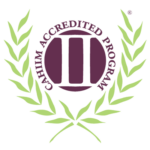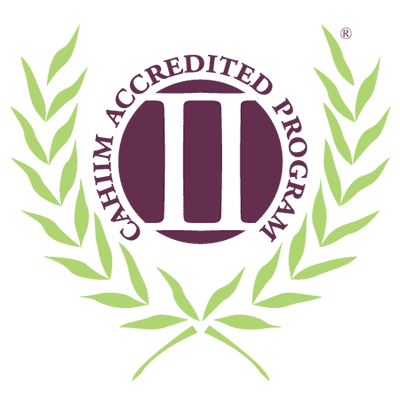Online Master of Science in Health Informatics
A Flexible Health Informatics Master’s Gives Tools to Improve Patient Care

- Accredited by The Commission on Accreditation for Health Informatics and Information Management Education (CAHIIM)*
- Expert faculty and hands-on learning experiences
- Learn transformative technologies and information practices
- Study IT for healthcare, including infrastructure and communication technology
- Specialize in Data Analytics to stand out in this in-demand field
The University of Scranton’s Master of Science in Health Informatics prepares you to translate numbers knowledge into better patient care. Learn information and communication systems, technologies and principles, and apply your knowledge in a final capstone project to emerge with unique skills to advance in rapidly growing health informatics jobs.
What Makes Us Unique?
No Previous Healthcare Experience Required. You can be new to the field of healthcare and apply without a GRE score. Our specially designed introductory courses allow you to succeed, providing you with the necessary foundation to thrive in the program and your future career.
500 Years of Tradition. The University of Scranton is one of only 27 Jesuit schools in the United States. Faculty are committed to ethics, social justice issues, experiential learning environments and service. You’ll be immersed in academic, moral and spiritual learning for your personal and professional development.
Learn More Today
Complete the form to get additional information about this program.
- Duration 2 years
- Cost per Credit $757
- Credit Hours 33
Program Benefits
- CAHIIM Accreditation
- 3 starts per year
- No application fee — now accepting applications
- Optional Data Analytics specialization
- Convenient online format

[MUSIC PLAYING]
DANIEL WEST: Masters of Sciences of Health Informatics is going to enable people to make they type of career advancements that they’re interested in.
MARGARETE ZALON: The core goal is to help students bridge information science, computer science, and health care in using resources, devices, and technology to improve patient care.
DANIEL WEST: The industry is moving so quickly in many different directions that people coming out of our program need to be able to adapt to this disruptive innovation.
MARGARETE ZALON: Towards the end of the program is a course on innovations and trends in health informatics. So students would be given the opportunity to focus on some of the latest things right before they go out into the job market.
The courses in our program include a mix of theoretical content and applied content. Students will get a foundation in information science. In addition, they’ll learn about how informaticists go about having to working in interdisciplinary teams.
We have faculty and students coming from a wide variety of areas so they get to learn to work with people who have different backgrounds.
The Jesuit values are ingrained in the curriculum, encouraging our students to be the very best they can, to be excellent.
DANIEL WEST: We’re very much interested in our graduates, how they develop as complete individuals. We believe that coming out of a Jesuit university makes a difference.
We have a very strong alumni network and we try, through career services, to tie people together.
We’re able to access graduates across the country who would be absolutely willing to work with you in your graduate education.
People in the health care industry are looking at how they can advance in their careers, how they can make a difference in their community.
MARGARETE ZALON: Our program will help graduates to take advantage of the many career opportunities in health informatics. And we need people to really take the leadership in this burgeoning field where health care professionals are really going to rely on people who can present information to them in a way that they can use an act upon.
[MUSIC PLAYING]
Enter Health Informatics Jobs to Support Healthcare Systems
With The University of Scranton’s Master of Science in Health Informatics degree, you can provide the big picture view to health practitioners and decision-makers to improve the quality of care and increase efficiencies. With data-driven knowledge, you will help improve the overall healthcare system and impact patient outcomes by strengthening safety and overall care. You can also specialize in Data Analytics to begin a career where health meets big data.
With expert faculty, small classes and a convenient online format, this degree will help you apply technology, policy, planning and quality management knowledge in numerous exciting roles. Among them, a health informatics master’s opens the door to informatics analyst roles within the healthcare industry.
With an accredited master’s degree in health informatics, you will be prepared for a variety of roles in healthcare to help transform data into information and knowledge that can be used for decision-making to improve the delivery of health care and patient outcomes. An accredited program provides you with an assurance of academic quality; that the program has met high standards for education in health informatics, and its faculty are committed to a systematic process for continuous improvement and innovation. Accreditation is a voluntary and rigorous process that provides an external review of how well the program is achieving its mission and goals. Graduates of accredited programs are prepared to meet the industry’s needs for professionals who can develop health informatics solutions to help their organizations meet the challenges of a rapidly changing healthcare environment.
Career Outlook: Tap Into the Momentum
Across the nation, healthcare institutions are feeling competing pressures to reduce their costs while continually improving the patient experience. They’re also working fast to integrate clinical and administrative data and facilitate the exchange of healthcare information to remove roadblocks to patient-centered care.
Health informatics professionals are prepared to meet these needs, and the field is growing rapidly.
Burning Glass projects positions for health information managers and directors will grow 20.5 percent through 2029, more than four times the national average. Master’s educated professionals in this position earn up to $106,000 annually.1
See the Career OutlookCurriculum: Designed by Expert Faculty
The MS in Health Informatics curriculum was designed by Scranton faculty, who are active leaders and experts in this burgeoning field. The general track includes 11 courses comprising 33 credit hours. What’s more, you can specialize in Data Analytics to delve into business analytics, data visualization, and other in-demand competencies. Prepare to join the next generation of ethical, responsible health informatics leaders with an education rooted in Jesuit values of ethics and integrity. Coursework in this online program includes:
- Information Technology for Health Informatics
- Population Health for Health Informatics
- Business Management and Communication for Health Informatics
- Current Trends in Health Informatics
Career-Focused Specialization
Extend your health informatics expertise — and stand out in this field — by selecting the optional specialization.
Program Outcomes
Complete the Master of Science in Health Informatics program to become the data-driven leader healthcare organizations need today. As you prepare for the next phase of your career, you will get the opportunity to:
- Use applicable theoretical knowledge and research evidence to support effective health informatics practice.
- Address the informatics needs of healthcare systems in diverse settings through computational thinking and integration of database and knowledge management skills.
- Integrate theories, models and tools from business, social, behavioral and information sciences, as well as user experience to advance informatics solutions for health data and its analysis.
- Demonstrate interprofessional team leadership and professionalism in healthcare informatics through effective oral and digital communication, and a commitment to ethics and life-long learning.
- Analyze the legal, risk management, safety, quality and ethical implications of health informatics policy and regulatory issues related to the use of health data, information and knowledge.
- Evaluate the user experience with health informatics to enhance efficiencies in the promotion of quality, safety and patient outcomes in person-centered environments.
- Evaluate the use of health informatics and emerging technologies and trends to support population health and innovation in healthcare.
- Select the optional Data Analytics specialization to identify patterns and relationships in big data. This work includes using numerous data mining techniques for data preparation, modeling, evaluation and application.
- Become familiar with what is required of being a Health Informatics student at The University of Scranton. The Health Informatics Manual can be downloaded for your convenience.
Enrollment Statistics
| Date* | Completed Applications | Number Accepted | Number Enrolled | Percent Enrolled | Graduated | Average Completion Time | Employed After Graduation |
| 2019-2020 | 8 | 8 | 7 | 87.5% | 12 | 26.5 months | 92% |
| 2020-2021 | 6 | 6 | 6 | 100% | 4 | 23 months | 100% |
| 2021-2022 | 7 | 7 | 4 | 57% | 11 | 28 months | 100% |
*Summer, Fall, Spring
Admission Requirements
To apply for the Master of Science in Health Informatics from The University of Scranton, you’ll need:
- Completed application
- 3.0 minimum undergraduate GPA
- Bachelor’s degree from an accredited college or university
- Official transcripts from all previously attended institutions
- Résumé
- Personal statement
- Two letters of recommendation from academic or professional references
- Background check disclosures and authorization
This program does not require a GMAT or GRE score.
Start the application today to advance toward a career in health informatics. Find more details on our admission requirements page.
View the Application ProcessTuition Details
The online Master of Science in Health Informatics at The University of Scranton consists of 33 credit hours and costs $757 per credit hour.
We strive to provide you with an affordable, high-quality education. That’s why U.S. News & World Report ranked us a Best Value School and one of the top Regional Universities North for 2022.2
See TuitionFaculty: Top-Tier Leaders in the Field
You’ll work directly with faculty we’ve carefully chosen based on their specific expertise and commitment to interdisciplinary education and the future of healthcare.
Our faculty are especially distinguished by their cutting-edge knowledge in high-level policymaking and global health, two of the most on-trend topics in health informatics.
Faculty at ScrantonEarn a degree without interrupting your career. You’ll be part of an online learning community led by a diverse and expert faculty. Online programs reflect the same rigorous standards as our on-campus programs.
Scranton OnlineFinancial aid options are available to help you pay for your education. A personal financial aid counselor will assist you in identifying and taking full advantage of all opportunities.
Financial Aid DetailsFrequently Asked Questions
If you have a question we don’t cover here, request more information or call 866-373-9547.
The capstone course includes a health informatics placement with the opportunity to work on a project aligned with the student’s interest.
With our online programs, you are in control of your own schedule and can complete your coursework at your convenience. Although there are weekly deadlines, you are not locked into participating at a particular time or place. You also can take your coursework with you when you travel. The program is completely portable: all you need is a computer with an internet connection to access your coursework.
Typically, students complete the online program in two years at a comfortable pace of one course per term. It is possible to take more than one course per term with your advisor’s approval. To see the curriculum, view our courses page.
Each term lasts eight weeks, beginning on a Monday and ending on a Sunday. The terms run back-to-back except for a three-week break at the end of December, and a one-week break at another part of the year. There are six terms per year.
You can enter the program three times per year—May, August or January.
Source:
- Labor Insight™ | Burning Glass Technologies
- U.S. News & World Report (2022). The University of Scranton Rankings. Retrieved February 3, 2022, from https://www.usnews.com/best-colleges/university-of-scranton-3384/overall-rankings
Footnote:

*The Health Informatics accreditor of The University of Scranton is the Commission on Accreditation for Health Informatics and Information Management Education (CAHIIM). The University’s accreditation for the master’s degree in Health Informatics has been affirmed through 2028-2029. All inquiries about the program’s accreditation status should be directed by mail to CAHIIM, 200 East Randolph Street, Suite 5100, Chicago, IL, 60601; by phone at (312) 235-3255; or by email at info@cahiim.org.